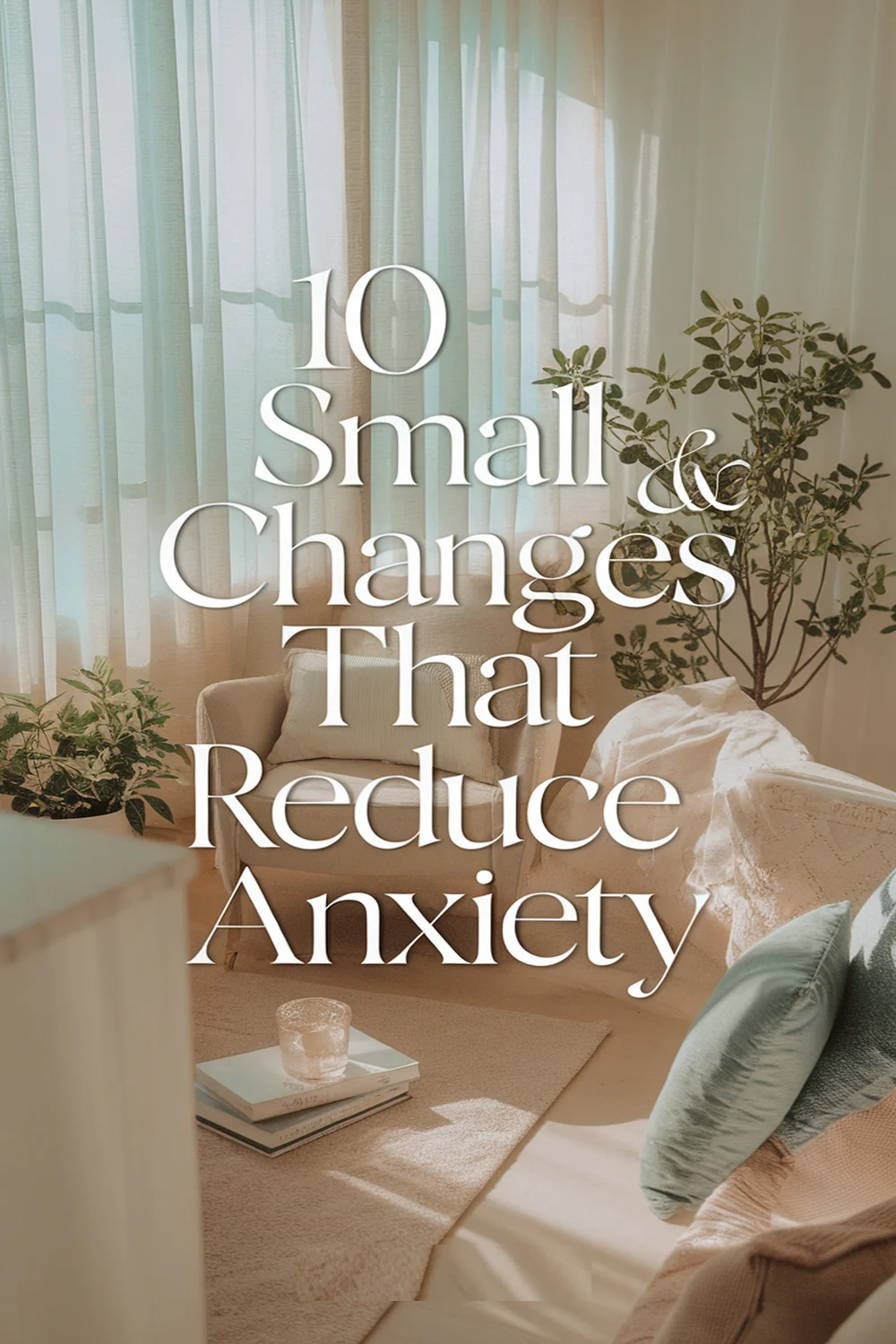To reduce stress every day, practice mindful breathing, engage in daily exercise, and maintain a gratitude journal. Limiting screen time helps create a calmer environment, while a consistent sleep routine enhances your overall well-being. Don’t forget to stay hydrated, connect with loved ones, and organize your space. Exploring relaxation techniques can further promote calmness. Make these simple habits part of your routine, and you’ll discover even more ways to manage stress effectively.
Practice Mindful Breathing
Sometimes, all it takes is a few deep breaths to help you feel more grounded. Mindful breathing shifts your focus from stressors to the present moment, offering clarity and calm. Research shows that intentional breathing techniques can lower cortisol levels, reducing anxiety and creating a sense of well-being. You can start by finding a quiet space, sitting comfortably, and closing your eyes. Inhale slowly through your nose for a count of four, hold for four, and exhale through your mouth for a count of six. Repeat this cycle several times. As you breathe, pay attention to the sensations in your body and the rhythm of your breath. This simple practice can revitalize your mind and body, making stress more manageable.
Incorporate Daily Exercise
Engaging in daily exercise can greatly enhance your ability to manage stress. Physical activity releases endorphins—those feel-good hormones that boost your mood and help combat anxiety. Even a brisk 30-minute walk can make a difference, clearing your mind and providing a chance to reflect. You don’t need a gym membership; simple activities like dancing, biking, or yoga can fit seamlessly into your routine. Regular exercise also improves sleep quality, giving your brain the rest it needs to handle daily challenges. Plus, the sense of accomplishment you feel after working out can elevate your confidence and resilience. Set realistic goals, find an exercise you enjoy, and make it a habit. Your body and mind will thank you for it!
Maintain a Gratitude Journal
When you take a few moments each day to jot down what you’re grateful for, you create a powerful tool for reducing stress. Research shows that maintaining a gratitude journal can improve your mood and promote emotional resilience. By focusing on positive aspects of your life, you shift your perspective away from stressors and negativity. Each entry allows you to acknowledge small joys, fostering a sense of contentment and purpose. Over time, this habit nurtures a more positive mindset, helping you cope better with daily challenges. Plus, reflecting on your gratitude can enhance your relationships by encouraging you to appreciate the support you receive from others. Try dedicating a few minutes each evening to this practice, and watch your stress levels begin to decrease.
Limit Screen Time
As you navigate through daily life, reducing screen time can have a significant impact on your stress levels. Studies show that excessive screen exposure increases feelings of anxiety and decreases overall well-being. You might find that cutting back on social media or limiting news consumption can create a calmer environment. Instead of scrolling mindlessly, consider engaging in activities that promote mindfulness—like reading, walking, or spending time with loved ones. Set specific boundaries for tech use, such as no screens during meals or before bed. By prioritizing face-to-face connections and real-world experiences, you’re not just reducing stress; you’re enhancing your quality of life. Remember, it’s about finding balance and making choices that nurture your mental health.
Recommended Items
Discover our favorite health and wellness essentials to help you reduce stress every day!
Establish a Consistent Sleep Routine
Finding balance with your screen time lays the groundwork for a healthier lifestyle, and one key element to support this is establishing a consistent sleep routine. Prioritizing a regular sleep schedule helps regulate your body’s internal clock, making it easier to fall asleep and wake up feeling refreshed. Aim for 7 to 9 hours of sleep each night, and stick to the same bedtime and wake-up time, even on weekends. This consistency can enhance your mood, boost your cognitive function, and reduce stress levels. Create a calming pre-sleep ritual by dimming lights, avoiding screens, and engaging in relaxing activities like reading or meditating. Your body and mind will thank you for these small yet significant changes to your daily routine.
Step-by-Step Guide to Reduce Stress
Spend Time in Nature
Spending time in nature can greatly lower your stress levels and improve your overall well-being. Research shows that just a stroll in a park or a hike in the woods can enhance your mood and reduce anxiety. Nature exposure allows your mind to unwind, helps you feel more connected, and promotes mindfulness.
Here’s a quick look at some benefits of spending time outdoors:
| Benefit | Description |
|---|---|
| Reduced Stress | Lowers cortisol levels in the body. |
| Enhanced Mood | Improves feelings of happiness. |
| Increased Focus | Improves concentration and attention. |
| Better Sleep | Promotes restful and restorative sleep. |
| Boosted Creativity | Stimulates innovative thinking. |
Make it a habit to step outside and embrace the natural world around you!
Stay Hydrated
Staying hydrated is essential for managing stress, as dehydration can lead to fatigue, irritability, and difficulty concentrating. When you’re not drinking enough water, your body struggles to function efficiently, which can amplify feelings of stress. Aim to drink at least eight glasses of water a day, and remember that your needs may increase with physical activity or hot weather. Keep a water bottle within reach and take sips throughout the day. You can also incorporate hydrating foods like fruits and vegetables into your meals. By making hydration a priority, you’ll boost your energy levels and mental clarity, helping you handle stress more effectively. So go ahead, grab that glass of water – your mind and body will thank you!
Connect With Loved Ones
Connecting with loved ones can immensely reduce stress levels and enhance your overall well-being. When you engage in meaningful conversations or share laughter, your body releases oxytocin, a hormone that promotes relaxation and trust. This connection creates a support system, making challenges feel less intimidating. Simply reaching out for a chat or scheduling time for a coffee can foster feelings of belonging and security. Even small gestures, like sending a quick text or sharing a memory, can brighten your day and strengthen these important bonds. Prioritizing time with loved ones not only alleviates stress but also boosts your mood. So, make it a habit to connect regularly—it’s a simple yet powerful step to improve your emotional health.
Organize Your Space
When you take the time to organize your space, you can considerably reduce stress and create a more calming environment. Clutter can overwhelm you, leading to feelings of anxiety and distraction. By decluttering your surroundings, you promote a sense of control and clarity. Start small; designate a few minutes each day to tackle one area, whether it’s your desk or a kitchen cabinet. Use storage solutions like bins or shelves to keep items in their place. You’ll find that a tidy space not only enhances your focus but also boosts your mood. Plus, maintaining organization can save you time and decrease frustration when searching for belongings. Prioritize this habit—your mental well-being will thank you.
Explore Relaxation Techniques
Once you’ve created an organized space, exploring relaxation techniques can further enhance your mental well-being. Deep breathing is a simple yet powerful method; try inhaling deeply for four counts, holding for four, and exhaling for six. This practice calms your nervous system and reduces stress hormones. Additionally, consider progressive muscle relaxation. Tense and then relax each muscle group, starting from your toes and working up to your head. You’ll notice bodily tension dissipating. Mindfulness meditation is another effective strategy; focus on your breath and observe your thoughts without judgment. Research shows these techniques can lower anxiety and boost mood. Incorporating just a few minutes of these relaxation practices into your day can make a significant difference to your overall stress levels.










